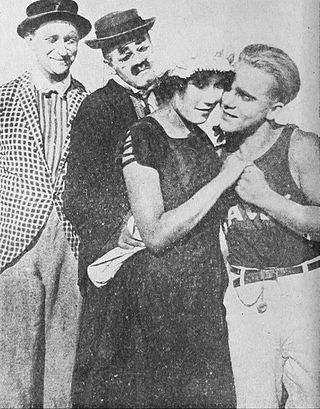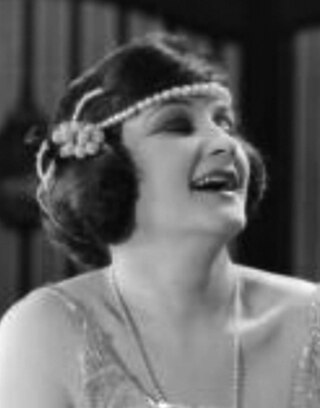Related Research Articles

Glynis Margaret Payne Johns was a British actress. In a career spanning eight decades on stage and screen, Johns appeared in more than 60 films and 30 plays. She received various accolades throughout her career, including a Tony Award and a Drama Desk Award, as well as nominations for an Academy Award, a Golden Globe Award and a Laurence Olivier Award. She was one of the last surviving stars from the Golden Age of Hollywood and classical years of British cinema.

Mabel Ballin, was an American motion-picture actress of the silent film era.

Basil Sydney was an English stage and screen actor.
Midnight Ramble is a 1994 documentary about the early history of Black American movies from the period between 1910 and 1950. Known as "race movies", these films, traditionally independent of Hollywood, were made primarily by, for and about the black community. This documentary is a tribute to a film genre that lasted for more than 40 years, produced over 500 movies, and created a foundation for contemporary films from directors such as Spike Lee and Tyler Perry. James Avery narrates this exploration of the early black film industry. There is a mistaken assumption that "race films" began largely in reaction to D. W. Griffith's 1915 The Birth of a Nation. Nothing could be further from the truth. Race movies actually began around 1910 in Chicago in response to the Black Community longing to see themselves reflected on the silver screen via this new medium of film. Wanting to see themselves through their own eyes, on their own terms thus counteracting the Hollywood stereotypes within the American media.
The Virgin of the Seminole is a 1922 race film directed, written and produced by Oscar Micheaux.

The Dungeon is a 1922 race film directed, written, produced and distributed by Oscar Micheaux, considered the African-American Cecil B. DeMille due to his prolific output of films during the silent era, one of his greatest works being Body and Soul (1924). The Dungeon was his first horror effort, an early blaxploitation take on the Bluebeard legend.

Margaret Victoria Anderson known professionally as Myrtle Lind was an American film actress. She was one of Mack Sennett's Bathing Beauties and appeared in several comedy films including with Oliver Hardy and John Gilbert. The Library of Congress has a photo of her holding a large camera on the beach.

Max Asher, born Max Ascher, was an American actor whose career spanned the early silent film era to talkies in the early 1930s. His career began on stage. He appeared in various comedic shorts. He was 5 feet 9 inches (1.75 m) tall, and weighed more than 200 pounds (91 kg). In the 1920s he transitioned to character actor roles.

Bessie Buskirk was an actress on stage and in silent films in the United States. She was a child actress on stage before becoming a film actress as an adult. Already in 1900, she was appearing on stage. She appeared in several short films in 1915 and continued to be cast in various credited roles into 1917.

Mollie King was an American stage and screen actress.

Dorcas Neville Matthews was an English actress in silent films in the U.S. She had numerous roles as a supporting actress and was well known.
Sybil Lewis was an actress in the United States. An African American, she appeared in several films including musicals during the 1940s. She appeared in African American films and Hollywood pictures. She had starring roles in several African American films including Lucky Gamblers and Am I Guilty? and portrayed smaller roles including as a maid in Hollywood films. She also had a leading role in Broken Strings (film) in 1940.
The Spider's Web is a 1926 American film directed by Oscar Micheaux which stars Evelyn Preer. It was remade in 1932 as The Girl from Chicago.
Georgia Rose was a 1930 film. It was directed by Harry Gant and stars Clarence Brooks. It followed the 1928 film Absent with Brooks as its star.
The Broken Violin is an American silent film directed by Oscar Micheaux, released in 1928.
All-American News was a film production company in the U.S. bringing war propaganda newsreels and entertainment films to African American audiences.

Harry Henderson was an actor in theater and films in the United States. He made four films with the Colored Players Film Corporation. He was also cast in several Oscar Micheaux films and had a starring role in the film melodrama The Scar of Shame. He portrays a wealthy concert pianist in the film. He also had a lead role in the 1926 film The Prince of His Race.
Historical Feature Films was a film production company in the United States. It was established in 1915 and produced at least 4 films. The company's films featured African American casts and included bigoted tropes and stereotypes that demeaned the characters. The studio's films were re-released by Ebony Film Corporation.
Money Talks Downtown is a 1916 American short comedy film with an African American cast. It stars Jimmy Marshall and Florence McCain. It includes derogatory racial stereotypes and a storyline about a woman seeking money and a man lightening his skin color to try and make himself more appealing. It was produced by Historical Feature Films and distributed by Ebony Film Company.
The Barber is a 1916 short comedy film by William D. Foster. The silent film was shot in black and white.
References
- ↑ "Shingzie Howard Cindirella story - added". The New York Age. March 31, 1923. p. 6 – via newspapers.com.
- ↑ Lupack, Barbara Tepa (November 8, 2013). Richard E. Norman and Race Filmmaking. Indiana University Press. ISBN 9780253010728 – via Google Books.
- 1 2 3 McCann, Bob (December 21, 2009). Encyclopedia of African American Actresses in Film and Television. McFarland. ISBN 9780786458042 – via Google Books.
- ↑ Moon, Spencer; Allen, Linda (April 27, 1997). Reel Black Talk: A Sourcebook of 50 American Filmmakers. Greenwood Publishing Group. ISBN 9780313298301 – via Google Books.